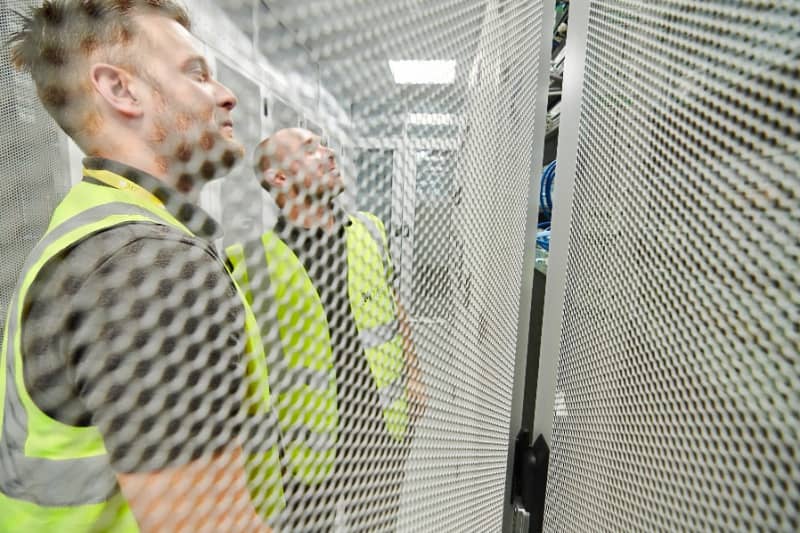Data centre management is an important part of the IT and connectivity industry, offering modern businesses and organisations the option to host their equipment in a state-of-the-art facility, instead of creating their own private data centre. But if you’re new to the world of data centre management & colocation hosting, you may need help understanding how important these facilities are, which is why we’ve created this article.
At M247, we’re experts in the world of connectivity, using our collective talents to improve the lives of our customers, one connection at a time. We offer our own selection of data centres and hosting services for our clients, covering the management of these solutions for you so you can focus on more pressing business matters.
To find out more about how we can help you, please make an enquiry with our team today.
An Introduction to Data Centre Management
Data centre solutions are integral for modern businesses and organisations. These facilities house a large network of computer systems and servers, which in turn store, process, and distribute large amounts of data on behalf of modern businesses.
Data centre management is the process of managing these facilities, which includes round-the-clock monitoring and maintenance of all system processes, as well as the secure storage of the data itself. Management may be undertaken by a team or a data centre manager, ensuring everything runs at full capacity.
Essentially, data centre management is crucial to the function and design of your data centre – without it, the facility would fail.
What Responsibilities Does a Data Centre Manager Have?
The job of a data centre manager is detailed, covering several different areas and services. Asset management involves a great deal of capacity planning, but the role isn’t just limited to that area.
The main responsibilities of a data centre manager are:
- Emergency planning, disaster recovery and continuity planning
- Technical support for clients and internal staff
- Data backup processes
- Upgrading hardware, software and operating systems
- Installing patches
- Conducting cyber security checks
- Integrating new connectivity solutions
- Data management and application storage
- Management of cooling and power systems
- Other general maintenance and management tasks
As you can see, data centre management is a role with several important functions, showing exactly why these jobs are so crucial for modern data centres and the businesses that use them.
What Are the Benefits of Data Centre Management?
There are many benefits to proper data centre management, ensuring that each facility is used to the best of its ability. Data is a vital asset for modern companies, making adequate data centre management crucial today.
By incorporating solid data centre management into a facility, managers can mitigate risk, ensuring that the data centre runs continually without failure or downtime, regardless of any issues that may crop up. This means that the infrastructure can be improved, whilst also ensuring efficient operations across the board. Performance issues and potential risks can be identified before they become a problem, ensuring efficiency is always as high as possible.
In some cases, data centres can even be managed remotely by using innovative data centre infrastructure management (DCIM) tools. DCIM software has improved rapidly over the past few years, providing managers with automated alerts and notifications whenever their key metrics drop. Day-to-day processes can be streamlined with ease, enabling future planning to be conducted to ensure your data centre manager is always prepared for any eventuality. This form of remote data centre management makes capacity planning and asset management much easier in the long run.
DCIM software also makes energy management easier, which is particularly important when running a data centre with colocation services. These data centres use large amounts of energy and power, which can be costly if managed incorrectly. Your DCIM system can monitor and control your energy, which in turn should reduce costs and minimise the risk of power outages.
To find out more about our advanced colocation services, please contact our team on 0808 253 6500.
Common Data Centre Management Challenges
Data centre management is largely beneficial for companies seeking colocation services, although some common drawbacks can hinder these operations if they’re not tackled appropriately. Asset management within a data centre can be a complex and difficult task (particularly if you have SLAs to meet), so the people managing a data centre facility must be fully trained with the correct experience for the role.
A poorly managed data centre can have many drawbacks, potentially putting its clients at risk. According to the Uptime Institute, human error is responsible for the majority of outages within modern data centres. Human error can never be completely eliminated from a system, but integrating innovative DCIM tools and AI software can mitigate the risk somewhat.
Another issue that can arise when dealing with this technology is equipment failure. If your data centre equipment fails, it can be extremely damaging to both your data centre and the remaining equipment housed in the building, so ensuring you have a robust risk management strategy is a must. Data breaches can occur if your equipment fails or you have a power outage, so data centre managers must ensure they have good cyber security tools in place – particularly ones that aren’t wholly reliant on your power or equipment.
Data centre managers also need to consider the risk of environmental hazards. Fire and flooding can cause considerable damage to data centre infrastructure, due to the large amount of electrical equipment contained within each facility. This is why it’s so important to have strict emergency protocols in place to reduce the risk of flooding and fire, as well as policies if the unthinkable does happen.
There’s a lot to keep track of, but don’t be discouraged from using a data centre, as most of these issues can be prevented with modern technology.
The Future of Data Centre Management
So, what does the future of data centre management look like? We can’t predict the future, but by analysing predicted trends and current changes within the world of IT, we can get a pretty good idea of what might happen.
For one, we expect to see an increase in hyperscale data centres. Hyperscale data centres are cloud server facilities built on a large scale, usually operated by big companies like Meta, Amazon and Microsoft. These buildings offer a centralised automated model and unmatched scalability, making them extremely useful for organisations that need more flexibility.
Another important trend on the horizon is environmental accountability. With the threat of climate change getting steadily worse, many data centres are now searching for sustainable solutions. The large amount of power used within data centre facilities can be a problem for green-minded managers. However, a number of eco-friendly data centres are currently being designed for cooler climates, meaning fewer resources are required to cool the servers, helping to solve this issue somewhat.
We also expect to see fewer people being employed within data centres, due to the advent of automation and other forms of new technology. Traditionally, data centres required the physical presence of on-call teams on site to deal with out-of-hours requests and cyber security issues. However, this form of data centre monitoring is being moved into the past, shifting instead to an automated model that uses advanced analytics and artificial intelligence (AI).
How Does DCIM Technology Help Data Centre Managers?
Data centre infrastructure management software has completely changed the data centre industry for the better, offering data centre managers the technology needed to enhance their roles and make their lives much easier. Many different DCIM tools exist, including powerful software kits that measure, monitor, and control your resources (for example, your energy consumption) and space, providing greater insights into the status of your data centre systems.
This software can collect data for data centre staff, which can then be used to both plan and monitor changes, enabling staff to prepare for the future. Examples of some of the things that can be managed with DCIM tools are:
- Current server capacity
- Current and predicted energy consumption
- Bandwidth scaling
- SLA data
- Room temperature
- Maintenance response times
DCIM software reduces the need for real-time monitoring in colocation data centres, providing tangible cost savings and a lowered risk of power outages, which can only be a good thing. We’ve recently seen the introduction of robotics, artificial intelligence and automation in many industries across the world, with AI becoming incredibly popular over the last couple of years. Some companies have started integrating this technology into their data centre management strategy with great success, showing that the future of DCIM tools is extremely bright.
It’s also important to note that DCIM tools used should be designed with ITIL standards in mind, following the framework set out in the IT Infrastructure Library (ITIL).
Optimise Your Data Centre Management with M247
Effective data centre management is an important part of modern business operations, ensuring your systems and hardware are secure, efficient, and scalable as needed. By understanding key aspects of data centre facilities like cooling, energy usage, and data security, modern organisations can optimise their infrastructure for long-term success.
It’s clear that having the right strategies in place is essential to meet today’s technological demands – regardless of whether you’re managing your own on-site servers or outsourcing to a colocation facility. With good management, you can make your data centre a powerful asset that drives forward innovation and supports your business growth.
At M247, we have our own selection of managed data centres and colocation hosting solutions, all of which can be scaled to your business needs and requirements. If you’d like to find out more, please get in touch with our expert team here.
Additional reading:




